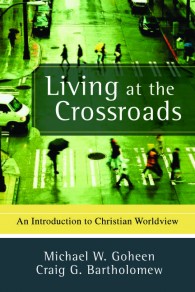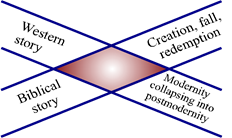Living at the Crossroads—An Intro to Christian Worldview…

What’s in a worldview? We all have one. We all live by one. Worldviews move the world. Yet many Christians are unaware of this useful concept and how it can help us sort through the challenges of living in a post-Christian culture—a culture that is radically at odds with the Christian view of how things really are.
The posts at The Humanitas Forum this week will focus on this important concept. We’ll look at worldview through the lens of a significant little book, Living at the Crossroads: An Introduction to Christian Worldview. The authors, Michael Goheen and Craig Bartholomew, are professors in Christian higher education. But their concerns are not limited to the academy. Both have pastoral experience and both are passionate about helping Christians become “faithful, relevant witnesses” in all walks of life—education, business, creativity and art, social work, sports, politics, and so on.
Goheen and Bartholomew see two theological truths as foundational to the Christian worldview.
The first truth is about who Jesus Christ is: he is the Creator and Redeemer of all things who rules all history and is moving it to his appointed end (Col. 1:15-20; Rev. 4-5). Jesus is Lord.
The second truth is that biblical salvation is comprehensive in scope and restorative in nature: God’s purpose in salvation is to restore the whole life of humankind in the context of a renewed creation.
If we believe that Jesus is Lord, then we must witness to Christ’s lordship in every area of human life and culture. If we believe that salvation is truly comprehensive, then we must embody Christ’s salvation in every area of human life and culture. To follow the Lord Jesus and witness to his salvation is to serve him in all things, confessing Christ’s rule over the whole of society and culture, taking a stand against all the evil that thwarts that rule.
In broad strokes, this summary describes key aspects of the Christian worldview—the grand story of God’s work in history encompassing creation, fall and restoration. All worldviews originate in some such overarching story, according to Goheen and Bartholomew. Embedded in all grand stories are “fundamental beliefs about the world” as well as “answers to questions of ultimate significance.”
· What is life all about?
· Who are we?
· What kind of world do we live in?
· What’s wrong with the world?
· How can it be fixed?
The answers to these questions are not merely philosophical in nature. Rather, they are beliefs so firmly embedded in our particular grand story that they “give shape and direction to the whole of our lives, both individual and corporate.” This is true of all worldviews, not just Christianity.
Our fundamental beliefs about the world and human life that underlie and shape all of our lives often remain below the level of consciousness, unarticulated and assumed. They function like tectonic plates that lie beneath the surface, unseen and yet powerful in the effect.
Living at the Crossroads was not written as an introduction to all the competing worldviews in contemporary culture. Rather, the goal is to help Christians live out the biblical worldview in the face of the challenges presented by the modern/postmodern “Western world-story.” In Wednesday’s post, we’ll take a closer look at that story—that very different worldview. For now, here’s how Goheen and Bartholomew describe the “unbearable tension” that exists between Christianity and the Western story.
First, like the biblical story itself, the Western story claims to be the true story of the world. In fact, it often simply assumes this distinction, masking its own grand claim to truth by relegating all other such stories to secondary status, as being merely “religious.”
Second, like the biblical story, the cultural story is all-embracing, with claims on every aspect of human life.
Third, the Western story is radically, although not totally, incompatible with the biblical story.
In this cultural situation, “the people of God find themselves at a crossroads, at the intersection of two stories, both of which claim to be both true and comprehensive.”
Unbearable Tension of
Living at the Crossroads

On Wednesday, we will look at the “unbearable tension” of living at the crossroads of the Western story and the Biblical story. And we’ll do so in light of a warning by the Dutch theologian Hendrik Kraemer: “The deeper the consciousness of the tension and the urge to take this yoke upon itself are felt, the healthier the Church is. The more oblivious of this tension the Church is, the more well established and at home in this world it feels, the more it is in deadly danger of being the salt that has lost its savour.”


 August 27, 2012
August 27, 2012 







Comments are closed.